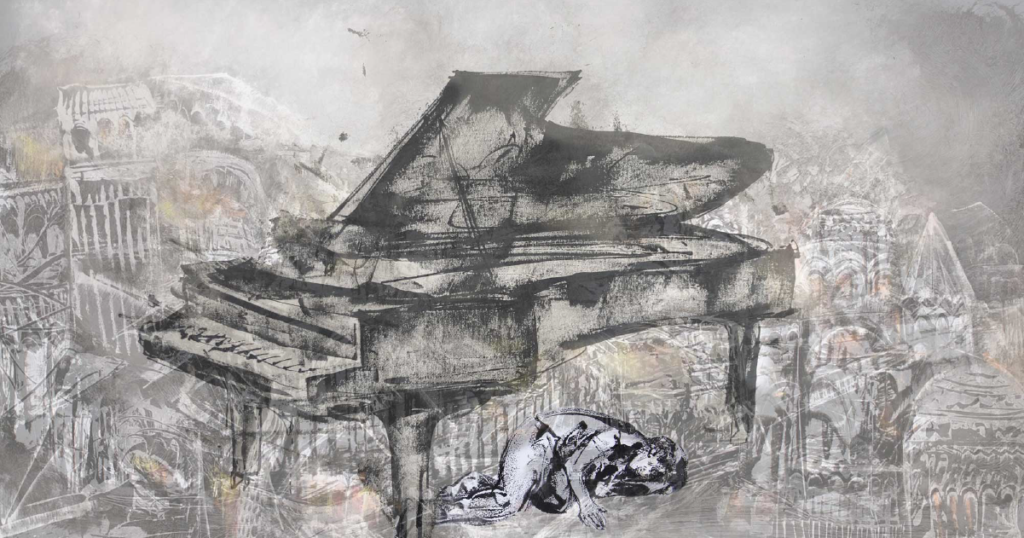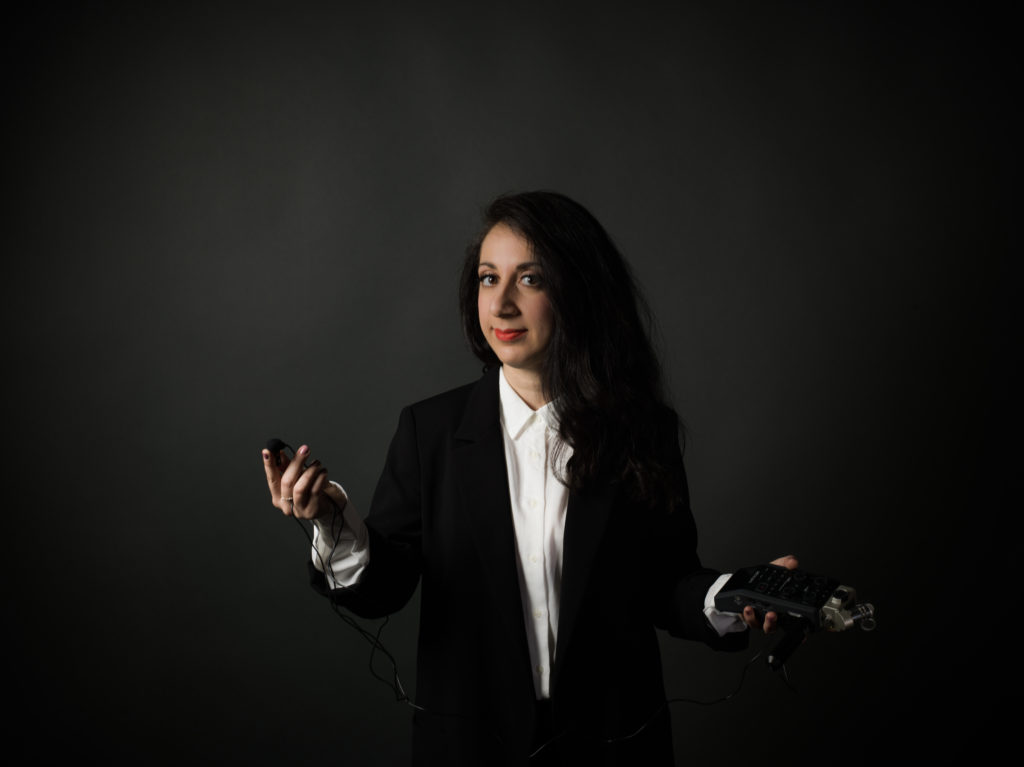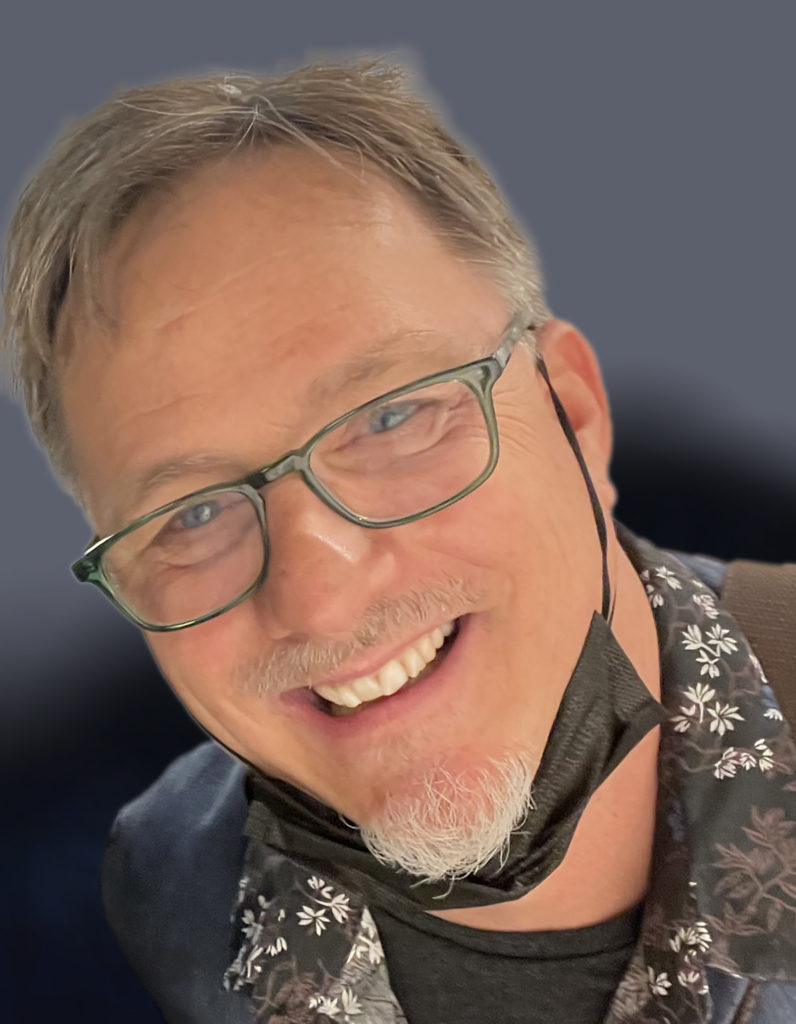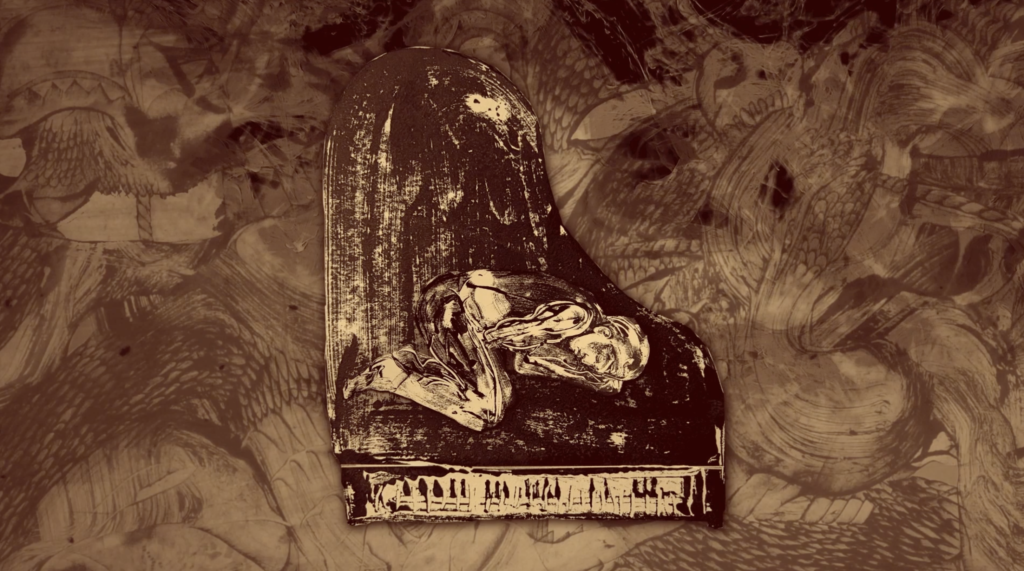
Alan Pierson, Alarm Will Sound Artistic Director/conductor, sat down with Mary Kouyoumdjian and Nigel Maister to discuss Paper Pianos, an evening-length theatrical work that explores the dislocation, longing, and optimism of refugees.
PREMIERE: FEBRUARY 25, 2023, EMPAC


Listen to an AI-generated version of this conversation (11′ minute listen):
Alan: Mary, tell us a little about how you came upon this story and started to think about making a piece out of it.
Mary: Paper Pianos started in 2016. I had applied for the Mizzou International Composers Festival with Alarm Will Sound and was selected to compose something for the festival. Then, in the spring of 2016, I met Milad Yousufi, who largely inspired Paper Pianos.
I met Milad through Michael Harley, the bassoonist with Alarm Will Sound. Milad had just come to the United States and was looking for a piano to practice on, and I had an upright piano that needed someone to practice on it. Milad told me his story of what it had been like living in Afghanistan while the Taliban was largely in power. They had forbidden music and artistic expression. Milad talked about what it was like learning how to play the piano on a piece of paper, on which he would draw piano keys and practice silently. He felt it was important to tell the story because he wanted people in the United States, who have freedom of expression, to appreciate the freedom we have to explore artistic things.
Alan: I remember you came to my apartment to talk about what you wanted to write for Alarm Will Sound and also this piece you wanted to write in the future based on Milad’s experience. We decided that we had this opportunity and we should take advantage of it, so you wrote “You Are Not a Kid,” the piece that was the beginning of Paper Pianos. Nigel, you helped to craft the story that would form the structure of Paper Pianos, correct?
Nigel: When Mary and I first spoke, we began imagining what the larger piece might be. It struck me that society doesn’t know very much about the stories and histories of those people who work behind the scenes, who welcome, provide support, and even adjudicate refugee cases. Mary and I decided that we’d like to explore some of those stories too. So it wasn’t only the stories of people leaving their homes but also the stories of the people working behind the scenes. That led Mary to come to Rochester and to organize interviews with some wonderful people. We ended up interviewing someone who writes about refugees in academia and those working at refugee organizations here in Rochester. It turns out that some of the people we interviewed were themselves refugees with compelling stories. We ended up learning about the incredibly complex and exhausting process of becoming a refugee. I believe most people, including myself, are unfamiliar with the process. People think, “Oh refugees! They just show up and ask for asylum.” Not only is “refugee” a very defined category of existence, but there are also enormous hurdles and challenges to getting refugee status.
Once we had harvested these hours of recordings, I went away and crafted something that fused these four stories together into a narrative. Then Mary wrote this amazing piece of music that uses that structure.
Alan: That’s a huge part of the process that is really interesting. Mary, I know working with interview footage and using it as part of your music is a large element in your work, generally. Could you talk about what it’s like to go from these bits of interviews that Nigel put together into a narrative to creating a piece of music from it?
Mary: Working with Nigel was a wonderful experience that will be hard to deviate from in the future! I’ve created a number of pieces with interview recordings in which I’m the one doing the interviewing, editing the material, and creating the narrative. Throughout the Paper Pianos process, Nigel brought new insights and perspectives to the interviews. He would ask questions I normally wouldn’t think to ask and see things I wouldn’t normally see. Then it was extremely helpful to have Nigel create the larger narrative out of all that material.
For me, once there was a linear story created, I placed them almost like a podcast into Logic and then started to imagine what the psychological trajectory of the work might be. How can I imagine what these individuals went through and how can I invite the audience to perhaps feel a fraction of what they felt? My goal is for the music to serve and support the different stories and to create a line of empathy between the listener and the speaker. What that means is that these stories are really uncomfortable at times, and so the music isn’t always pleasant. Sometimes it’s really difficult to sit through. Sometimes it’s aggressive and violent, but I think that discomfort is important in creating space for someone to think about how hard these experiences are. Hopefully, that discomfort stays with them long after the concert is over, and they will continue to think about these experiences.
Alan: Nigel, you then received Mary’s score and had to imagine how to create an audience experience with Alarm Will Sound on stage. Can you tell me about that process?
Nigel: The goal is to try and tell these stories through a mixture of somewhat staged performance, audio/visual material, text, and music but without traditional dramatic narrative. The piece is more thematic in how it deals with these stories, trying to find a commonality between each speaker’s experience. Kevork Mourad is doing designs and animations for the piece using abstract representations of the individuals speaking. The piece also uses a young Syrian refugee child who will stand in for Milad and some of the other people whose voices we hear. So it’s not really a drama; it’s more a symbolic narrative that tries to explore the experience these people share.
What’s come through to me in creating this is that we tend to think of the refugee experience as “Oh you flee from a terrible place and you come to a better place and make yourself a new life there. Isn’t that wonderful?” But I think what gets lost in that mix is that once you get to this new place, it’s very difficult. And leaving a home behind for a different home is torturous beyond obviously being harrowing. And relocating–even to a better place–can be a mixed blessing. What you hear in these stories is not only the achievement of arriving in safety and making a new life but also how that new life necessitates the loss of much more than just a previous home. I think the piece is as much about the success of the refugee experience as about the enormity of the personal cost of that experience.
Alan: Mary, that makes me think of your family’s experience coming from Armenia.
Mary: As far as my own family’s experience with displacement, my grandparents were displaced from what was then part of Armenia, during the Armenian Genocide. They went through Syria and settled in Lebanon. Then my parents and brother were displaced to San Francisco from Beirut because of the Lebanese Civil War, and recently my family was further displaced from Beirut because of the 2020 port explosion. My larger Armenian community is currently being displaced from Armenia and Nagorno-Karabakh/Artsakh because of tensions with Azerbaijan.
Nigel: “Tensions.” That’s a very diplomatic way of saying it.
Mary: Well, I think our world hasn’t chosen a word for what’s going on there.
Even within my own family, there are so many generations of refugees. I think this experience ends up being a lot more common than we ever care to admit. Within all our families we have histories of refugees. So some of the things we’re hoping to highlight are those themes that everyone can connect on––like we all, regardless of circumstance, want a safe place to live. We all want freedom of expression. We all want love and community. We want the freedom to have an education. So one of the larger goals of the piece is to present this not necessarily as a political piece, though it is, but primarily a piece about humans sharing experiences with other humans.
Nigel: There’s an old trope about the United States being a nation of immigrants which, with the exception of Native Americans and the Black experience of slavery, I think is absolutely true. And a lot of people who are immigrants in this country fled from situations that were extremely dire whether they are Jewish or Irish or Armenian. But we also, through years of habituation and upward mobility, tend to be severed from what that actually meant to those who sought that refuge originally. We don’t actually know what that experience is. One of the things this piece tries to put before us is the reality of the experience these people lived: they could be killed for playing music, so they made a paper piano. We believe these examples help bring the realities home in a way that goes beyond the “nation of immigrants” trope which is very easy to say without truly comprehending the story behind it.

Alan: Could you talk about Kevork’s role in making the piece?
Mary: Kevork has been a collaborator of mine for many years. His work, at its heart, deeply explores displaced communities, particularly from some of the regions explored in this piece. So he already had a very organic sense of how to tell these stories, and he also has a family history immersed in the refugee experience. Something that I really love about his artwork in this particular piece is that while his animations represent the speakers who were presenting, they don’t necessarily directly depict them. There’s a little bit of ambiguity in the images you see. For me, the strength in this is that while you watch these animations and the symbolic representations of speakers, there’s space to imagine your own loved ones going through these experiences. Seeing a visual abstraction of an individual is very different from watching a documentary film and seeing raw footage of someone speaking.
Alan: Any last things you think people should know before coming to see Paper Pianos?
Nigel: <laughs> I think Mary is amazing.
Alan: <laughs> I agree.
Mary: I think in the seven years we’ve been working on this piece (which is a long time!), the world has already seen so many different iterations of displacement–whether it was with the Syrian refugee crisis, what’s going on currently in Ukraine, or the travel ban in the middle of all of this and how that impacted our country’s invitation to refugees. So I hope that this piece creates an access point for some of the things that the world has experienced just in the past several years.

